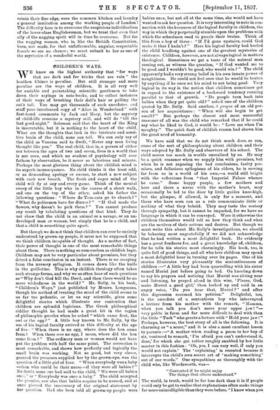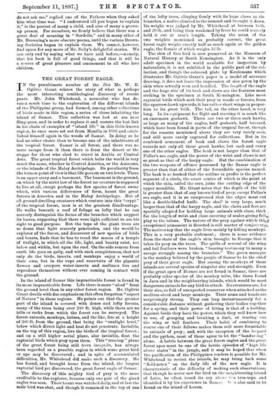OHILDREN'S WAYS.
WE know on the highest authority that " for ways that are dark and for tricks that are vain " the heathen Chinee is peculiar. But still stranger and more peculiar are the ways of children. It is all very well for amiable and painstaking scientific gentlemen to take down their sayings in note-books, and to collect instances of their ways of brushing their doll's hair or pulling the cat's tail. You may get thousands of such anecdotes. and stuff your interleaved copy of " Alice in Wonderland " with first-hand comments by Jack and Mary, but the mystery of child-life remains a mystery still, and will do "till the last good-night." Solomon said that the heart of the King is inscrutable, but it is nothing to the heart of the child, What are the thoughts that lurk in the intricate and sensi- tive brain of the child, none can tell. We can only say of the child as Vanessa said to Swift, "Never any man living thought like you." The real child, that is, a person of either sex between the ages of two and seven, lives in a world that is not ours, and which no student of psychology will ever fathom by observation, be it never so laborious and minute. Perhaps the most glorious thing about the childish mind is its superb inconsequence. No child thinks it the least odd, or as demanding apology or excuse, to start a new subject with each new breath. The fresh and eager mind of the 'hild will fly at any and every game. Think of the mental sweep of the little boy who in the course of a short walk, and one on the top of the other, asked his father the lollowing questions : " Where do Tom-cats go to church F " "What do policemen have for dinner ? " "If God made the flowers, why doesn't he pick them ? " You cannot produce any result by tabulating questions of that kind. They do not show that the child is an animal or a savage, or an un- developed man or woman, but simply that he is a child, and that a child is something quite apart.
But though we do not think that children can ever be entirely understood by grown-up people, it must not be supposed that we think children incapable of thought. As a matter of fact, their power of thought is one of the most remarkable things about them. There is nothing so remorseless as childish logic. Children may not be very particular about premises, but they detect a false conclusion in an instant. There is no escaping from the nursery syllogism. It comes down like the knife in the guillotine. This is why childish theology often takes such strange forms, and why we so often hear of such questions as "Why don't God kill the Devil, and then there would be no more wickedness in the world?" Mr. Sully, in his book, "Children's Ways," just published by Messrs. Longmans, though his method of treating the mind of the child seems to us far too pedantic, or let us say scientific, gives some delightful stories which illustrate our contention that children are splendid logicians. The Greek philosophical fiddler thought he had made a great hit in the region of philosophic puzzles when he asked " which came first, the owl or the egg ? " A little boy known to Mr. Sully, by the use of his logical faculty arrived at this difficulty at the age of five : " When there is no egg, where does the hen come from ? When there was no egg, I mean, where did the hen come from ? " The ordinary man or woman would not have put the problem with half the same point. The correction is most remarkable, and shows how perfectly and logically the small brain was working. Not so good, but very clever, granted the premises supplied her by the grown-ups, was the question of a little girl of four. " When everybody was a baby —then who could be their nurse—if they were all babies " No doubt some one had said to the child, " We were all babies once," or " Everybody was once a baby." The child accepted the premise, saw also that babies require to be nursed, and at once pierced the inaccuracy of the original statement by her question. Had she been told all grown-ap people were babies once, but not all at the same time, she would not have wanted to ask her question. It is very interesting to note in con- nection with the keenness of the logical faculty in children, the way in which they perpetually stumble upon the problems with which the schoolmen used to puzzle their brains. Think of this from a boy of three : "If I'd gone upstairs, could God make it that I hadn't ? " Here his logical faculty had hurled the child headlong against one of the greatest mysteries of existence. Children, however, are not always logical in matters theological. Sometimes we get a taste of the natural man coming out, as witness the question, " If God wanted me to be good and I wouldn't be good, who would win ? " The child apparently had a very strong belief in his own innate power of naughtiness. He could not feel sure that he would be beaten by anything if he once set his mind to not being good. Very logical in its way is the notion that children sometimes get in regard to the existence of a backward tendency running parallel to that of growth. " Do people turn back into babies when they get quite old? " asked one of the children quoted by Mr. Sully. Said another, a propos of an old per- son of her acquaintance : " When will she begin to get small?" But perhaps the closest and most successful reasoner of all was the child who remarked that if he could say what he liked to God, it would be : " Love me when I'm naughty." The quick flash of childish reason had shown him the great need of humanity.
We have said that we do not think much does, or can, come of the sort of philosophising about children and their ways adopted by Mr. Sully and observers of his school. The child moves too much in worlds unrealised by us. He may be a quick reasoner when we supply him with premises, but when he is not exposing the bad conclusions, faulty pre- mises, and fallacious syllogisms of his elders, he is moving far from us in a world of his own,—a world still bright with the reflections from " that Imperial Palace whence he came." Some happy people, a few mothers and here and there a nurse with the mother's heart, may occasionally be led to the door by little guides knee-high, but the glimpse, if allowed, is only for a moment, and those who have seen can as a rule communicate little or nothing of what they beheld. They may taste the ecstasy through sympathy, but it cannot be imparted, for we have no language in which it can be conveyed. Were it otherwise the children themselves would tell as how they think and what are the motives of their actions and desires. But though we must write this about Mr. Sully's investigations, we should be behaving most ungratefully if we did not acknowledge that he had written a most delightful book. He evidently has a great fondness for, and a great knowledge of, children, for he tells his stories most charmingly. His book, too, is quite full of good things, and all who love children may spend a most delightful hour in turning over its pages. One of his stories illustrates very pleasantly the sententiousness of children :—" A little boy had been quarrelling with his sister named Muriel just before going to bed. On kneeling down to say his prayers and noticing that Muriel was sitting near and listening, he prayed aloud in this wise, 'Please, God, make Muriel a good girl,' then looked up and said in an angry voice, Do you hear that, Muriel ? ' and after this digression resumed his petition." Delightful, too, is the anecdote of a sententious boy who interrupted a lecture from his mother with the remark, "Mamma, when you talk you don't move your upper jaw ! "- very polite in form and far more difficult to deal with than the little " Turk" who greets a lecture with " Hold your jaw !" Perhaps, however, the best story of all is the following. It is charming as "a score," and it is also a most excellent lesson to parents :—" A mother when reading a poem to her boy of six, ventured to remark, I'm afraid you can't understand it, dear,' for which she got rather roughly snubbed by her little master in this fashion : Oh, yes, I can very well, if only you would not explain.' The explaining' is resented because it interrupts the child's own secret art of making something' out of our words." One sympathises so thoroughly with the child who, like Wordsworth, was- " Contented if he might enjoy
The things that others understand."
The world, in troth, would be far less dark than it is if people could only be got to realise that explanations often make things far more unintelligible than they were before. "I know when you
do not ask me," replied one of the Fathers when they asked him what time was. " I understood till you began to explain it," is the protest of many a child, and also of many a grown- up person. For ourselves, we firmly believe that there was a great deal of meaning in " Sordello," and in many other of Mr. Browning's more obscure poems, until the various Brown- ing Societies began to explain them. We cannot, however, -find space for any more of Mr. Sully's delightful stories. We can only end by saying what we have said before,—namely, that his book is full of good things, and that it will be a source of great pleasure and amusement to all who love children.



































 Previous page
Previous page